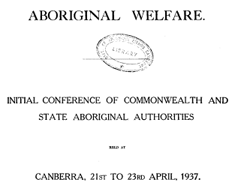Aboriginal timeline: Politics
Found 175 results for your search. Showing page 1 of 9.
1885
-
The Queensland Elections Act 1885 excludes all Aboriginal people from voting.
1889
-
A judgement of the Lords of the Judicial Committee of the Privy Council finds that New South Wales, at the time of the arrival of the British, was in fact "a tract of territory practically unoccupied, without settled inhabitants or settled law" and that it was "peacefully annexed". [1] The ruling goes on to become the skeleton of Australian law with no court daring to rule against it. [2]
1893
-
In an amendment to the Constitution Act 1889 Western Australia extends voting rights to include all British male subjects over the age of 21, but not Aboriginal males.
1895
-
All adult females in South Australia, including Aboriginal females, win the right to vote.
1901
-
Federation - The Commonwealth Constitution states "in reckoning the numbers of people… Aboriginal natives shall not be counted". It also states that the Commonwealth would legislate for any race except Aboriginal people. This leaves the power over Aboriginal Affairs with the states.
-
The government introduces the white Australia policy, trying to ban all non-Caucasian people from entering the country.
1902
-
The Commonwealth Parliament passes the Commonwealth Franchise Act 1902 which grants men and women in all states the right to vote in federal elections, but denies it to every ‘aboriginal native’ of Australia, Asia, Africa, or the Islands of the Pacific (if they not already had the right to vote in state elections at the time of the Act).
1904
-
The Queensland Government takes control of the Torres Strait Islands from the London Missionary Society. Torres Strait Islanders become subject to the Queensland Aboriginal Protection Act and wards of State.
1905
-
Walter Roth, Chief Protector of Aborigines in Queensland, who had been appointed to work for the Royal Commission on the Condition of the Natives, releases his report. Although mild in his criticism, the report stirred a vast response in the press with many articles reporting about the "slavery" in Western Australia. Roth's findings led to the passing of the Aborigines Act 1905 in December that year.
The full report is available on the website of the Western Australian Parliament.
-
The Western Australian government passes the Aborigines Act 1905 which commences in April 1906. It is designed to better protect and care of the Aboriginal people of Western Australia but in reality ruled over all aspects of Aboriginal lives for nearly 60 years. The Act created the position of Chief Protector of Aborigines who became the legal guardian of every Aboriginal child to the age of 16 years, and permitted authorities to remove Aboriginal children from their families. It establishes reserves and sets the rules governing Aboriginal employment.
1908
-
The Invalid and Old Age Pensioner Act provides social security for some but not for Aboriginal people.
1910
-
The Aborigines Protection Board Act is passed, giving the Board ‘legal’ control over Aboriginal people on stations and reserves but not missions, in the Northern Territory.
-
The Victorian Aborigines Act permitted the Board for Protection of Aborigines to help ‘half-castes’ by licensing needy persons to live on stations.
1912
-
Maternity allowance is introduced but does not include Aboriginal people.
1918
-
The Northern Territory Aboriginal Ordinance Act "ensured that Aboriginal people could not drink or possess or supply alcohol or methylated spirits, could not come within two chains of licensed premises, have firearms, marry non-Aboriginal people without permission or have sex across the colour line". [3] The Ordinance also forbids mining on Aboriginal Reserve Land.
1922
-
Regulations in the Northern Territory exclude Aboriginal people from voting. Officials have the power to decide who is Aboriginal.
1933
-
Yorta Yorta man William Cooper establishes the Australian Aborigines' League in Melbourne together with Margaret Tucker, Eric Onus, Anna and Caleb Morgan, and Shadrach James. Cooper is secretary of the League which campaigns for the repeal of discriminatory legislation and First Nations representation in the Australian Parliament.
1936
-
Western Australia Aborigines Act is amended to permit Aboriginal people to be taken into custody without trial or appeal and to prevent them from entering prescribed towns without a permit.
1937
-

Aboriginal Welfare - Conference of Commonwealth and State Authorities called by the federal government, decides that the official policy for some Aboriginal people is assimilation policy. Aboriginal people of mixed descent are to be assimilated into white society whether they want to be or not, those not living tribally are to be educated and all others are to stay on reserves. The minutes of the meeting say:
“The destiny of the natives of aboriginal origin, but not of the full blood, lies in their ultimate absorption… with a view to their taking their place in the white community on an equal footing with the whites.” [4]
In practice, assimilation policies lead to the destruction of Aboriginal identity and culture, justification of dispossession and the removal of Aboriginal children.
In 50 years we should forget that there were any Aborigines in this country.
— A.O. Neville, Western Australian Chief Aboriginal Protector [5]
1938
-
The NSW government changes Aboriginal policy from ‘protection’ to assimilation following the 1937 conference.
References
View article sources (0)
[72145] Cooper v Stuart (1889) 14 App Cas 286, 291 (Lord Watson), available at www.bailii.org/uk/cases/UKPC/1889/1889_16.html, retrieved 8/9/2019
[72145a] 'In our land not yet won, who are we Australians?', SMH 26/1/2019
[9563] dreamtime.net.au/indigenous/timeline3.cfm
[9106] National Library of Australia, nla.gov.au/nla.aus-vn118931
[9106a] 'Governments are attempting to steal our original sovereign citizenship and independence', First Nations Interim National Unity Government 16/6/2013
